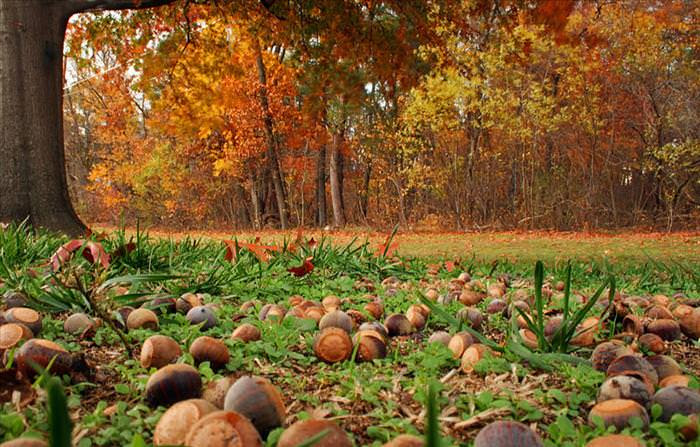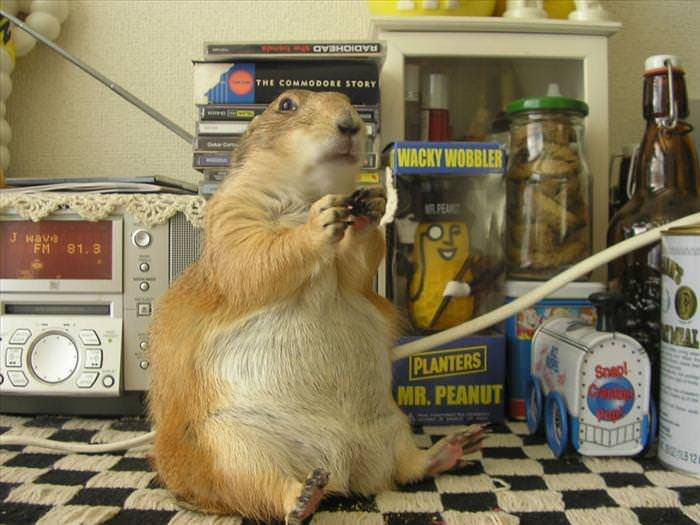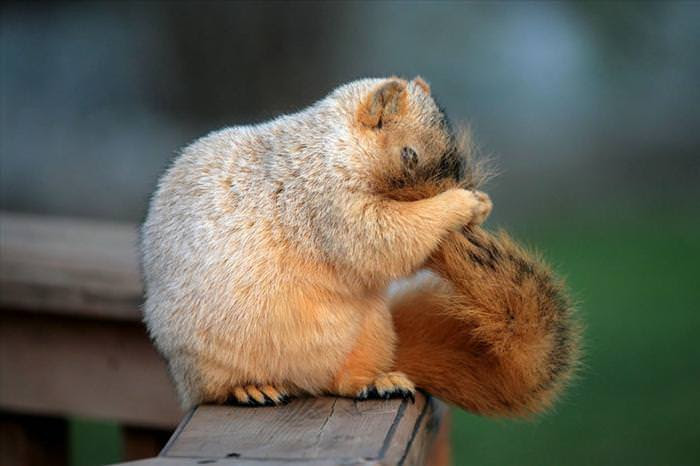Squirrels often appear on people's "favourite animals" list, probably because they're incredibly adorable, funny and furry. But they are much more, they are incredibly fast, resourceful, hard working and have an amazing sense of direction. They love hoarding and preparing for winter months, and will make sure they gather enough for a decent winter hoard.
Lets have a look at these cute little guys, and how they live:

Fall is the time for squirrels to gather as much food as possible in a mad dash to a well stocked food pile before winter settles in. They bring collected food into their homes in hollow trees or the ground

A squirrel dream feast. Some ground squirrels start preparing for winter as early as early summer. The gray and fox squirrels have a 'scatter hoarding' pattern, in which they hide their hoarded food in many various locations, coming back for it later. A tree squirrel doesn't hibernate during winter, and so needs to have a daily supply of food.

A squirrel with its trophy, Kharkiv, Ukraine. Not only do squirrels love walnuts, but their brain is about the same size!

A curious and furry little squirrel.

Happy to have a snack.

Many tree squirrels have long hair on their ears.

When we think of squirrels, we usually think of the tree squirrel, and they can be found in forests, parks and even urban environments.

As rodents, squirrels have four front teeth that never stop growing, so they can keep gnawing away as they please. They've even been known to chew through power cables, causing blackouts.

The bushy tail we love so much serves the squirrel well. It keeps them balanced, soften their jumps and helps them communicate with other squirrels.

Almost got it. Even squirrels fall out of trees sometimes, but they mostly use their tails as parachutes and are rarely harmed.

When hungry, a squirrel will eat outside its regular diet of plants and nuts, and start eating insects, eggs, small birds, small snakes and even smaller rodents.

Red berries are a delicious treat.

Many squirrels dig like crazy during the fall, to make many hiding places for their food hoard.

Gray squirrels sometimes have darker or lighter shades, like this rare white squirrel here.

And of course, they serve to entertain frustrated cats on a daily basis.

Squirrely love? Squirrels communicate through chirps and shrill little sounds, expressing anything from fear to contentment.

A playful red squirrel.

Squirrels come in a variety of colours and looks. These squirrels all stopped to take a photo, but can run very fast if needed. An officer that once used a radar gun to clock a Gray squirrel, found he was moving at 20 mph (32 kph).

This squirrel is not albino, otherwise it would have red eyes. It is just a white squirrel enjoying a nibble.

This squirrel shows its agility by fence walking.

Squirrel excited over these unexpected yummies.

A black squirrel having a rest. All this searching, digging and hiding is tough work.

The antelope ground squirrel is one of the skinnier squirrels, and has a permanent 'youngling' look.

The squirrel family includes tree squirrels, ground squirrels, chipmunks, marmots (including woodchucks), flying squirrels, and prairie dogs. This fat prairie dog has it pretty good, not having to search for its food. May be why it has let itself go a little.

Fall season means work work work.

Fussing over its fur, this squirrel is wiping its face with its tail.

Squirrels don't really like swimming, as it's very hard on them. They only swim if they really have to.

Squirrels are just as curious as cats, even when it comes to the ferocious owl.

A squirrel meets a White-throated Kingfisher. Who will leave the branch?

Sunset and silhouette taken in Edmonton, Alberta, Canada
No comments:
Post a Comment